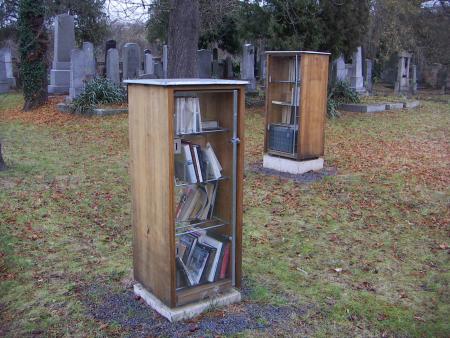LIBE 477 B: MODULE 8: DEVELOPING WORLD LIBRARIES/MOBILE DEVICES:
I have never really considered the development of libraries around the world. Upon researching I came across interesting libraries and services and was inspired by the lengths that people will go to to get books into the hands of others.
Grace Dobush writes an article depicting how “libraries can come in all kinds of creative and unusual forms.” There are many fascinating examples of how books end up in the hands of readers. One library is called “the graveyard library” located in a “Jewish cemetery in the Austrian town of Krems an der Donau…the graveyard contains a series of bookshelves [called The Open Library] [which] “consists of three bookshelves in the size and shape of gravestones, with glass doors protecting books in English, German and Hebrew about Jewish philosophy and the history of death” https://qz.com/773248/libraries/
Dobush (2016) also describes mobile libraries in Mongolia (via camel) https://gohelp-charityrallies.weebly.com/mobile-library-project.html and northern Columbia via "burro." https://qz.com/773248/libraries/
http://www.pbs.org/pov/watch/biblioburro/
Sara Bernard (2018) writes an article Room to Read: Building Libraries, Schools and Computer Labs in Developing Countries: One man’s simple plan to expand worldwide literacy, thousands of libraries at a time.” about John Wood http://www.leavingmicrosoftbook.com/who founded a non profit international organization called “Room to Read” (https://www.roomtoread.org/) which “builds bilingual libraries, schools, and computer labs in developing countries…Room to Read has established programs in Cambodia, India, Laos, Nepal, South Africa, Sri Lanka, Vietnam, and Zambia” (https://www.edutopia.org/global-education-libraries-developing-countries)
Room to Read developed from an initial reaction where Wood, upon visiting a school library in Bahundanda, Nepal found few books locked in a cabinet with little access to the 450 students felt “a moral obligation to reach out and do a lot more…[he] has taken his dream from an initial donkey-load of donated books to an organization that has built thousands of libraries and hundreds of schools” (Bernard, 2008. https://www.edutopia.org/global-education-libraries-developing-countries).
Having access to books and technology is crucial to 21st-century learning. What we aspire to do locally is what we should aspire to do worldwide. In a BC Government document "Libraries Without Walls: The World Within Your Reach, A Vision for Public Libraries in British Columbia" (2004) there are goals that can be adopted by developing countries. The 2004 vision includes the importance of
- Facilitate equitable access to information for all
- Encourage collaboration and partnerships to improve service delivery cost effectively
- Initiate government reform
In the article, BC Government Releases Strategic Plan for Public Libraries (2016) https://librarianship.ca/news/inspiring-libraries/) the author reminds us that "libraries bridge the physical and digital worlds, connecting people not only with a world of information but with each other. They support and contribute to life-long learning by providing safe, open spaces for people of all ages" This idea should not only prevail locally but worldwide.
The 2020 BC government vision for public libraries is very similar to the 2004 document.
- Improving Access
- Building Capacity
- Advancing Citizen Engagement
- Enhancing Governance
The World Literacy Foundation website reminds us that "access to reading and learning materials in developing countries can be difficult to obtain...Without access to public learning spaces, which are often taken for granted in most developed countries, people are less likely to elevate themselves out of poverty through accessing books and other materials" https://worldliteracyfoundation.org/the-power-of-libraries/
So whether here in BC or across the developing world, the difficulties are the same. "Students often have to travel far to access public libraries and then find their services lacking thus preventing them from furthering or improving their education" https://worldliteracyfoundation.org/the-power-of-libraries/
One thing we know for sure, there are many dedicated people who will do what they can to ensure that access to libraries and technology will be a dream come true!
References
BC government releases strategic plan for public libraries (2016). Retrieved from https://librarianship.ca/news/inspiring-libraries/
BC’s strategic plan for public library service (2020). Retrieved from https://www2.gov.bc.ca/assets/gov/education/administration/community-partnerships/libraries/libraries-strategic-plan.pdf
Bernard, Sara. (2008). Room to read: Building libraries, schools and computer labs in developing countries. Retrieved from https://www.edutopia.org/global-education-libraries-developing-countries
Biblioburro. [Web page]. (n.d.). Retrieved from http://www.pbs.org/pov/watch/biblioburro/
Dobush, G. (2016). Every book lover will want to visit these unusual libraries from around the world [Web page]. Retrieved from https://qz.com/773248/libraries/
Room to read [Web page]. (n.d.). Retrieved from https://www.roomtoread.org/
The power of libraries [Web page]. (n.d.). Retrieved from https://worldliteracyfoundation.org/the-power-of-libraries/
Wood, J. (2006). Leaving Microsoft to change the world: An entrepreneur’s odyssey to educate the world’s children. Retrieved from http://www.leavingmicrosoftbook.com/
https://worldliteracyfoundation.org/the-power-of-libraries/












Wow, some very interesting stories and examples of book delivery and literacy support. The Book Cemetery and the Book Tank Mobile were fantastic, and something I've never heard about before. Thank you for including the BC Government plan for Library Services as well, as that provides some insight into our own province and our goals and initiatives to support literacy across BC. A comprehensive review and introduction of many important organizations and groups working to provide better access to information.
ReplyDeleteThank you for this blog post! I really appreciated all the visuals you incorporated into your presentation. I found the different forms of libraries that you shared to be so interesting. I know our brick and mortar buildings aren't always the most practical or popular forms that public libraries take in other places around the world, but seeing the pictures of books in graveyards or on donkey's backs really brought the point home.
ReplyDelete